最新have 与 have got区别
小升初英语语法专题精讲学案 have和have got用法区别 (难度简单)
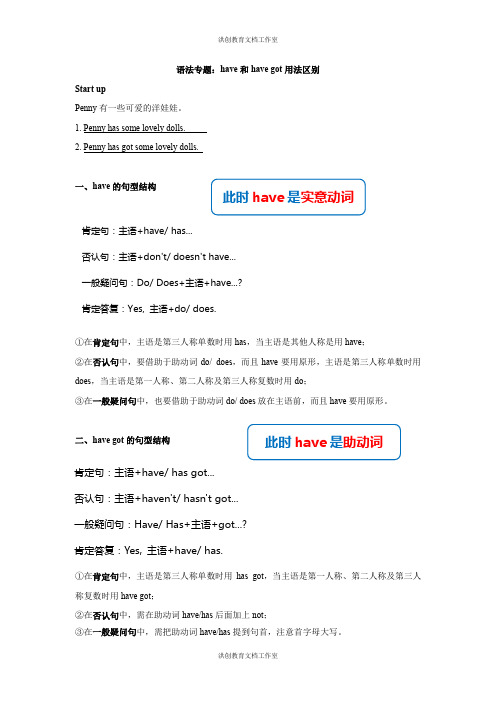
语法专题:have 和have got 用法区别Start upPenny 有一些可爱的洋娃娃。
1. Penny has some lovely dolls.2. Penny has got some lovely dolls.一、have 的句型结构①在肯定句中,主语是第三人称单数时用has ,当主语是其他人称是用have ;②在否认句中,要借助于助动词do/ does ,而且have 要用原形,主语是第三人称单数时用does ,当主语是第一人称、第二人称及第三人称复数时用do ;③在一般疑问句中,也要借助于助动词do/ does 放在主语前,而且have 要用原形。
二、have got 的句型结构①在肯定句中,主语是第三人称单数时用has got ,当主语是第一人称、第二人称及第三人称复数时用have got ;②在否认句中,需在助动词have/has 后面加上not ;③在一般疑问句中,需把助动词have/has 提到句首,注意首字母大写。
肯定句:主语+have/ has... 否认句:主语+don't/ doesn't have...一般疑问句:Do/ Does+主语+have...?肯定答复:Yes, 主语+do/ does. 此时have 是实意动词 此时have 是助动词肯定句:主语+have/ has got... 否认句:主语+haven't/ hasn't got...一般疑问句:Have/ Has+主语+got...? 肯定答复:Yes, 主语+have/ has.练一练一、单项选择。
( ) 1. _______ he _______ a new pencil case?A. Has; getB. Does; haveC. Has; have( ) 2. They _______ some beautiful stickers.A. have gotB. has gotC. has( ) 3. Su Yang _______ any pens.A. hasB. has gotC. hasn't got( ) 4. What _______ the twins got in their bags?A. hasB. haveC. do( ) 5. David's friend _______ some nice toy planes.A. hasB. haveC. have got二、用所给单词的适当形式填空。
have和havegot的用法区别

have和havegot的用法区别have 作某些意义时,与have got 通用,have got 是英国英语。
一、两者在肯定句、否定句和疑问句中的形态不一样1、肯定句have: 主语+ have/hashave got: 主语+ have got ('ve got) / has got ('s got)2、否定句have: 主语+ do not (don't) / does not (doesn't) + havehave got: 主语+ have not (haven't) / has not (hasn't)3、一般疑问句have: Do / Does + 主语+ have?have got: Have / has + 主语+ got?二、两者的共同意义,此时两者通用1、讨论拥有的东西,意为“有,持有,占有”,通常不用进行时,例如:I have/have got a new mobile phone.我有一部新手机。
Paul doesn’t have/hasn’t got a car.保罗没有汽车。
2、讨论与别人的关系,意为“有”,通常不用进行时,例如:Jane has/has got a brother.简有一个哥哥。
He has/has got three children.他有三个孩子。
3、讨论性质,特征,意为“显示出,带有”,通常不用进行时,例如:She has/has got blue eyes.她有一双蓝眼睛。
The house has/has got gas-fired central heating.这所房子有燃气中央供暖系统。
4、讨论生病或暂时的状态,意为“患…,有…”,通常不用进行时,例如:I have/ I’ve got a cold.我感冒了。
They have/have got a problem.他们有麻烦了。
have got和have的用法
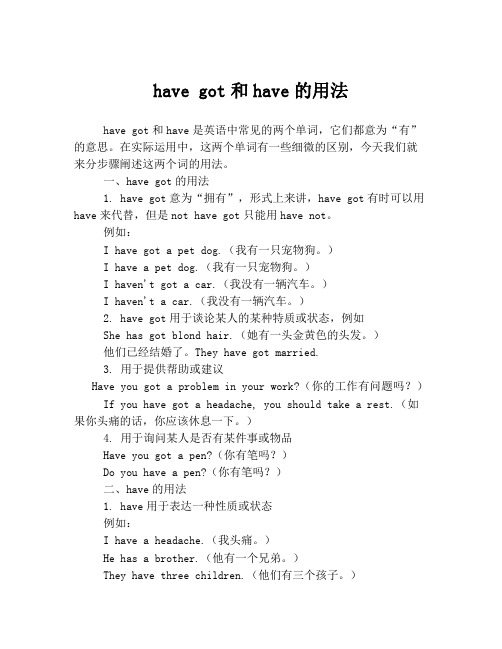
have got和have的用法have got和have是英语中常见的两个单词,它们都意为“有”的意思。
在实际运用中,这两个单词有一些细微的区别,今天我们就来分步骤阐述这两个词的用法。
一、have got的用法1. have got意为“拥有”,形式上来讲,have got有时可以用have来代替,但是not have got只能用have not。
例如:I have got a pet dog.(我有一只宠物狗。
)I have a pet dog.(我有一只宠物狗。
)I haven't got a car.(我没有一辆汽车。
)I haven't a car.(我没有一辆汽车。
)2. have got用于谈论某人的某种特质或状态,例如She has got blond hair.(她有一头金黄色的头发。
)他们已经结婚了。
They have got married.3. 用于提供帮助或建议Have you got a problem in your work?(你的工作有问题吗?)If you have got a headache, you should take a rest.(如果你头痛的话,你应该休息一下。
)4. 用于询问某人是否有某件事或物品Have you got a pen?(你有笔吗?)Do you have a pen?(你有笔吗?)二、have的用法1. have用于表达一种性质或状态例如:I have a headache.(我头痛。
)He has a brother.(他有一个兄弟。
)They have three children.(他们有三个孩子。
)2. have和has用于构成现在完成时态,表示“已经完成”,例如:I have finished my homework.(我已经完成了我的家庭作业。
)She has read this book before.(她以前读过这本书。
have与havegot区别
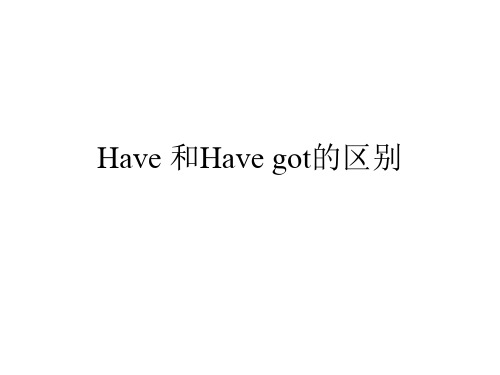
Exercise:
He rides the motorbike to his factory every day.
The motorbike is ridden to his factory every day.
I am going to meet Tom at the station at six. 我六点钟要到火车站去接汤姆。
• 2.表示说话人根据已有的迹象认为非常可 能即将发生某事。如:
Look at these black clouds——it is going to rain. 看这些乌云——要下雨了。 I’m afraid I’m going to have a bad cold. 恐怕我要得重感冒了。
He is fourteen this year, and he will be fifteen next year. 他今年十四岁,明年十五岁。
• 二、Shall+动词原形 Shall 用于第一人称 表示建议或征求对方的意见。
Shall we go at eight? 我们八点去好吗? I shall go now.
They make shoes in that factory.
Shoes are made by them in that factory. were
被动语态的大体构成: Be + PP(过去分词)
主动语态变被动之歌:
被动语态强调宾,be后加上过去分。 Be要随着主语变,人称时态要弄准。 行为对象作主语, 逻辑主语by来引。
• 注意:
• 1. 如果be going to后接的是形容词或副词 (there)时,其后应加上be,然后再接形容 词或副词。
I’m going to be busy this Sunday.
have和have got和there be 等相近词的辨析
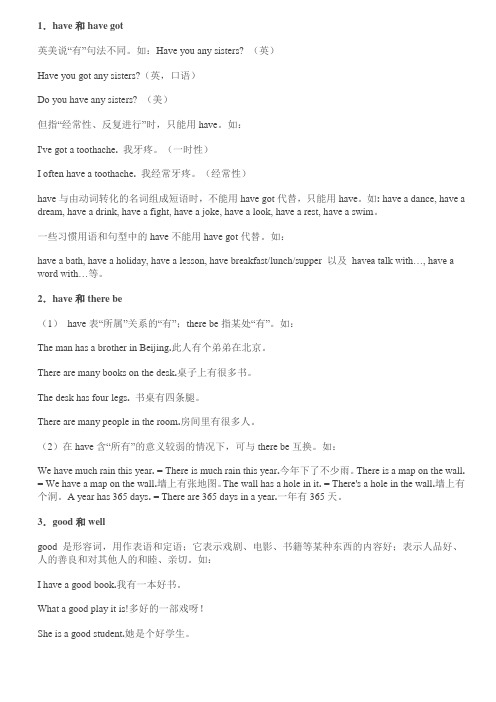
1.have和have got英美说“有”句法不同。
如:Have you any sisters? (英)Have you got any sisters?(英,口语)Do you have any sisters? (美)但指“经常性、反复进行”时,只能用have。
如:I've got a toothache.我牙疼。
(一时性)I often have a toothache.我经常牙疼。
(经常性)have与由动词转化的名词组成短语时,不能用have got代替,只能用have。
如: have a dance, have a dream, have a drink, have a fight, have a joke, have a look, have a rest, have a swim。
一些习惯用语和句型中的have不能用have got代替。
如:have a bath, have a holiday, have a lesson, have breakfast/lunch/supper 以及havea talk with…, have a word with…等。
2.have和there be(1)have表“所属”关系的“有”;there be指某处“有”。
如:The man has a brother in Beijing.此人有个弟弟在北京。
There are many books on the desk.桌子上有很多书。
The desk has four legs.书桌有四条腿。
There are many people in the room.房间里有很多人。
(2)在have含“所有”的意义较弱的情况下,可与there be互换。
如:We have much rain this year. = There is much rain this year.今年下了不少雨。
have与have got的用法

have与have got的用法Have与Have Got的用法Have和Have got都是表示“有”的意思,但在使用上有一些区别。
1. HaveHave是一个常规的动词,表示拥有或持有某物。
它可以用于各种时态和语态,如:- 现在时:I have a car.(我有一辆车。
)- 过去时:She had a headache yesterday.(她昨天头疼。
)- 将来时:We will have a party next week.(我们下周要开派对。
)- 现在完成时:He has finished his homework.(他已经完成了作业。
) - 被动语态:The book has been read by many people.(这本书被很多人读过。
)2. Have gotHave got是have的口语形式,通常只用于现在时态。
它的意思与have相同,但有时会强调拥有某物的事实。
例如:- I have got a new phone.(我有一部新手机。
)- She has got a lot of friends.(她有很多朋友。
)- Have you got any money?(你有钱吗?)注意:在英式英语中,have got也可以用于过去时和将来时,但在美式英语中不常用。
3. 区别虽然have和have got的意思相同,但在使用上有一些区别:- Have got通常只用于口语,而have可以用于口语和书面语。
- Have got强调拥有某物的事实,而have则没有这种强调。
- Have got不能用于进行时态,而have可以。
例如:I am having a good time.(我正在度过愉快的时光。
)4. 常见用法除了表示“有”之外,have和have got还有一些常见的用法:- Have a good time.(玩得愉快。
)- Have a look.(看一看。
)- Have a seat.(请坐。
完整word版,have_havegot以及there_be的区别
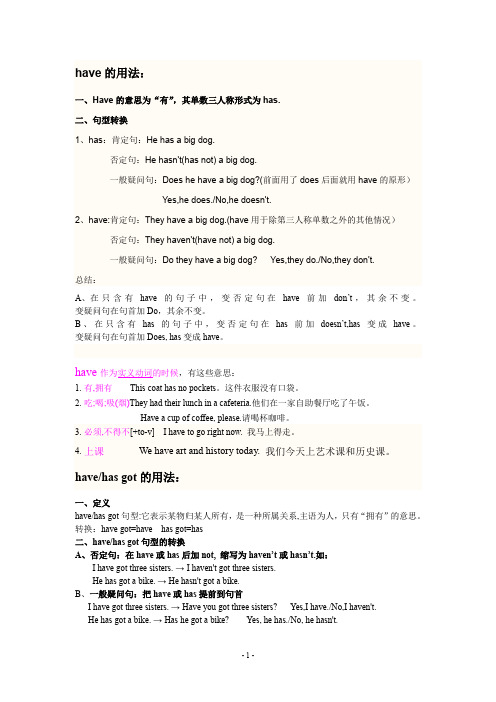
have的用法:一、Have的意思为“有”,其单数三人称形式为has.二、句型转换1、has:肯定句:He has a big dog.否定句:He hasn't(has not) a big dog.一般疑问句:Does he have a big dog?(前面用了does后面就用have的原形)Yes,he does./No,he doesn't.2、have:肯定句:They have a big dog.(have用于除第三人称单数之外的其他情况)否定句:They haven't(have not) a big dog.一般疑问句:Do they have a big dog? Yes,they do./No,they don't.总结:A、在只含有have的句子中,变否定句在have前加don’t,其余不变。
变疑问句在句首加Do,其余不变。
B、在只含有has的句子中,变否定句在has前加doesn’t,has变成have。
变疑问句在句首加Does, has变成have。
have作为实义动词的时候,有这些意思:1.有,拥有This coat has no pockets。
这件衣服没有口袋。
2.吃;喝;吸(烟)They had their lunch in a cafeteria.他们在一家自助餐厅吃了午饭。
Have a cup of coffee, please.请喝杯咖啡。
3.必须,不得不[+to-v] I have to go right now. 我马上得走。
4.上课We have art and history today. 我们今天上艺术课和历史课。
have/has got的用法:一、定义have/has got句型:它表示某物归某人所有,是一种所属关系,主语为人,只有“拥有”的意思。
转换:have got=have has got=has二、have/has got句型的转换A、否定句:在have或has后加not, 缩写为h aven’t或h asn’t.如:I have got three sisters. →I haven't got three sisters.He has got a bike. → He hasn't got a bike.B、一般疑问句:把have或has提前到句首I have got three sisters. →Have you got three sisters? Yes,I have./No,I haven't.He has got a bike. →Has he got a bike? Yes, he has./No, he hasn't.there be 句型一、定义there be句型是一常见的表示“存在”的句型。
have,have got,have got to的区别

have与have got的用法have, have got表示占有,相互关系和其他状态。
实际上这涉及到have动词的三种用法,作助动词,作实义动词单用,以及have got。
虽然他们意思相同,但是用法存在一定差别(特别是地域性差别)。
一般来说,我们避免直接使用have形式 (原文:“这看起来不自然”) 在十分正式的英国英语里面,还可以使用 Have you sth.?以及 I haven't sth. ,这在美国英语是绝对不出现的。
在非正式文体中, have got更好。
但是have got形式不经常用在其他时态,比如 I had got , I will have got都比较少见。
但是可以与情态动词合用: She must have got a nice present.当我们表达重复性动作的时候,使用do + have的形式,而不是have got 以上的用法以英国英语为标准。
如果在美国英语里面, do + have几乎是最常用的形式,口语中则会出现 have got。
不过随着时间的推移,美国英语对英国英语影响越来越大,现在do + have的形式也经常被使用。
have和 have got的区别,尤其是在疑问句和否定句方面。
2、在英语口语中,常用have got 代替have ,作“有”解。
I have a bike. = I have got a bike.(1) 其否定式为:I don’t have a bike. = I haven’t a bike.I haven’t got a bike. (√)I don’t have got a bike. (×)(2) 其疑问形式为:Have you a bike? / Have you got a bike?Do you have a bike? (√)Do you have got a bike? (×)3、在下列情况下不能用have got来代替have。
have 与 have got区别
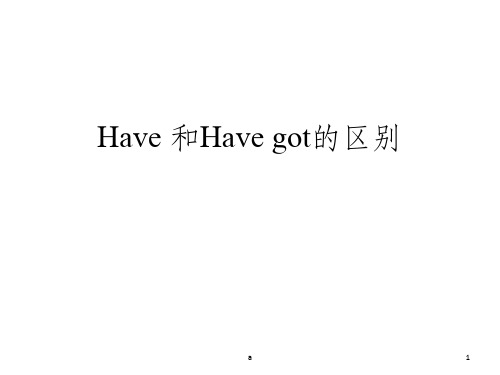
a
16
Passive
被动语态
a
17
一:英语的谓语动词有两种语态
We speak
主语
谓语
English.
宾语
主动语态
English is spoken by us.
主语
谓语
宾语
宾变主,主变宾,前加by
a
13
• 4.在问对方是否愿意或表示客气的邀请或 命令时,常用will。
Will you go to see a film with us? 你愿意和我们一起去看电影吗? 5.表示不以人们的意志为转移的规律。
He is fourteen this year, and he will be fifteen next year. 他今年十四岁,明年十五岁。
• Li Hong had a problem yesterday. • I have had the bike for three years.
a
5
固定短语中不能用Have/has got
Have breakfast/ lunch/dinner/supper Have a cup of tea/ coffee/ cigarette Have a bath/ a shower/ a swim/ a rest Have a party/ a holiday/ a nice time Have an accident/ an experience Have a look/ a chat/ a baby Have difficulty/ trouble/ fun
I am going to meet Tom at the station at six. 我六点钟要到火车站去接汤姆。
have got的用法总结

have got的用法总结“have got”在英语中是一个常见的动词短语,它的用法非常灵活,可以用于各种时态和语态。
下面是对“have got”用法的详细总结:表示拥有:最基本的用法是表示某人拥有某物。
例如,“I have got a new car.”(我有一辆新车。
)这里,“have got”表示拥有的动作或状态。
时态变化:“have got”可以根据需要进行时态变化。
例如,现在完成时是“have/has got”,过去式是“had got”,将来时是“will have got”。
不过,在实际使用中,“have/has got”通常被简化为“have/has”,而“will have got”则较为少见。
与“have”的区别:“have”和“have got”在表示拥有的意义上是相似的,但“have got”更强调拥有的状态。
另外,“have got”后面通常直接跟名词,而“have”后面则可能跟其他类型的词,如形容词、动词等。
固定搭配:“have got”还有一些固定搭配,如“have got to”(必须,不得不)和“have got sb./sth. done”(让某人/某物被……)。
这些固定搭配中的“have got”有特定的含义和用法。
替代用法:在某些情况下,“have got”可以替换为其他动词短语,如“own”(拥有)、“hold”(持有)等。
然而,这些替换可能会改变句子的语气或重点。
综上所述,“have got”是一个功能强大的动词短语,它可以用于各种语境和时态中表达拥有和必须做某事等含义。
通过掌握其用法和搭配,我们可以更准确地使用英语表达自己的意思。
have与have got用法
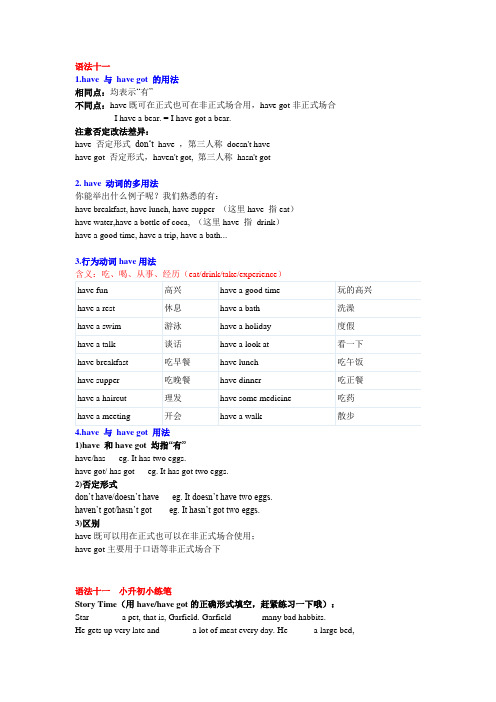
语法十一1.have 与have got 的用法相同点:均表示“有”不同点:have既可在正式也可在非正式场合用,have got非正式场合I have a bear. = I have got a bear.注意否定改法差异:have 否定形式don‘t have ,第三人称doesn't havehave got 否定形式,haven't got, 第三人称hasn't got2. have 动词的多用法你能举出什么例子呢?我们熟悉的有:have breakfast, have lunch, have supper (这里have 指eat)have water,have a bottle of coca, (这里have 指drink)have a good time, have a trip, have a bath...3.行为动词have用法4.have 与have got 用法1)have 和have got 均指“有”have/has eg. It has two eggs.have got/ has got eg. It has got two eggs.2)否定形式don’t have/doesn’t have eg. It doesn’t have two eggs.haven’t got/hasn’t got eg. It hasn’t got two eggs.3)区别have既可以用在正式也可以在非正式场合使用;have got主要用于口语等非正式场合下语法十一小升初小练笔Story Time(用have/have got的正确形式填空,赶紧练习一下哦):Star ______ a pet, that is, Garfield. Garfield ______ many bad habbits.He gets up very late and ______ a lot of meat every day. He______a large bed,so he has to sleep on the floor every night. What about you? _______you ______ a lovely pet?。
英语have与have got的区别

*(一)、have与have got:建议查看《英语用法指南》(Practical English Usage, Michael Swan 著)第241条目have, have got表示占有,相互关系和其他状态实际上这涉及到have动词的三种用法,作助动词,作实义动词单用,以及have got。
虽然他们意思相同,但是用法存在一定差别(特别是地域性差别)一般来说,我们避免直接使用have形式(原文:“这看起来不自然”)在十分正式的英国英语里面,还可以使用Have you sth.?以及I haven't sth. ,这在美国英语是绝对不出现的。
在非正式文体中,have got更好但是have got形式不经常用在其他时态,比如I had got ,I will have got都比较少见。
但是可以与情态动词合用:She must have got a nice present.当我们表达重复性动作的时候,使用do+have的形式,而不是have got以上的用法以英国英语为标准。
如果在美国英语里面,do+have几乎是最常用的形式,口语中则会出现have got。
不过随着时间的推移,美国英语对英国英语影响越来越大,现在do+have的形式也经常被使用。
have和have got的区别尤其是在疑问句和否定句方面一、在英语口语中,常用have got 代替have ,作“有”解。
I have a bike. = I have got a bike.1.其否定式为:I don’t have a bike. = I haven’t a bike.I haven’t got a bike. (√)I don’t have got a bike. (×)2.其疑问形式为:Have you a bike? / Have you got a bike?Do you have a bike? (√)Do you have got a bike? (×)二、在下列情况下不能用have got来代替have。
have 与 have got区别(课堂PPT)

21
6
Future
将来时态
7
一般将来时表示在将来某个时间 要发生的动作或存在的状态
• 一、be going to+动词原形 • 1.表示打算在最近或将来要做某事。这种
打算往往是事先考虑好的。如: My brother is going to learn English next year. 我哥哥准备明年学英语。 I am going to meet Tom at the station at six. 我六点钟要到火车站去接汤姆。
11
• 二、Will +动词原形 Will 可用于任何人称(口语中)
1.表示主动愿意或要求去做某事 The bag looks heavy. I’ ll help you with it.
12
• 2.表示预料中将要发生的动作或情况。 You’ll feel better after having this medicine. 吃了这药,你就会感到好些的。
8
• 2.表示说话人根据已有的迹象认为非常可 能即将发生某事。如: Look at these black clouds——it is going to rain. 看这些乌云——要下雨了。 I’m afraid I’m going to have a bad cold. 恐怕我要得重感冒了。
9
• 注意: • 1. 如果be going to后接的是形容词或副词
• 3.will表示人的主观意愿,它带有浓厚的 感情色彩。 Come earlier tomorrow, or I won’t let you in. 明天早点儿来,否则我不让你进来。
外研版-英语-六年级上册-6A Module3 Unit1 Have和Have got的区别

Have和Have got的区别1. Have got在英国英语中的意思是“有”肯定句中:第一、二人称单数I、you和所有人称的复数作主语时使用。
表示,我/你/我们/你们/它们、他们、她们有…….例如:I/You/We/They have got a car.否定句用法:haven’t got(即have not got)例如:I/You/We/They haven’t got a car.一般疑问句用法:have提前,回答用have或haven’t例如:Have you/they/we got a car? Yes,I /they/we have 或No, I/they/we haven’t.have got的第三人称单数形式为has got. 第三人称单数he、she、it和单数名词作主语时使用has got肯定句中:She/He/It has got a car.否定句:She/He/It hasn’t got a car.一般疑问句中has 提前,回答用,has或hasn’tHas he/she/it got a car.?Yes,he/she/it has. 或No,he/she/it hasn’t.2.Have 在美国英语中的意思是“有”。
在由have作谓语的句子变疑问句或否定句时,在美式面中,无论何种情况,都要借助于助动词do或does肯定句: 第一、二人称单数I、you和所有人称的复数作主语时使用。
表示,我/你/我们/你们/它们、他们、她们有……I/You/We/They have a car.否定句:用don’t haveI/You/We/They don’t have a car.一般疑问句中要用do提问:回答用do或don’tDo you/we/they have a car?Yes,I/we/they do?或No,I/we/they don't Have 的第三人称单数为has。
英语have与have_got区别
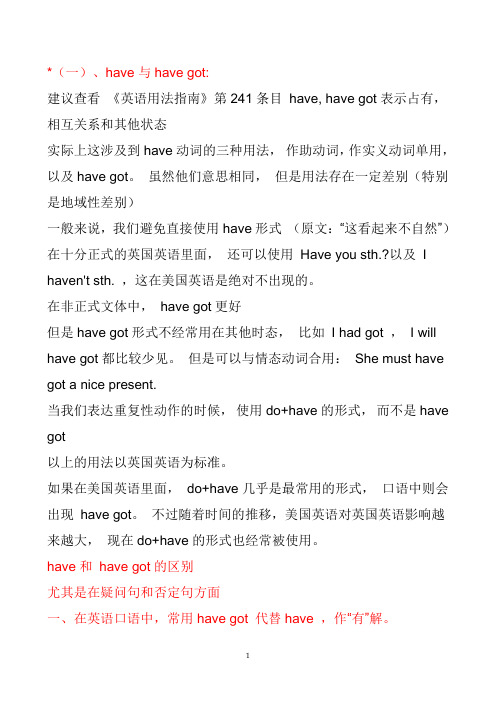
*(一)、have与have got:建议查看《英语用法指南》第241条目have, have got表示占有,相互关系和其他状态实际上这涉及到have动词的三种用法,作助动词,作实义动词单用,以及have got。
虽然他们意思相同,但是用法存在一定差别(特别是地域性差别)一般来说,我们避免直接使用have形式(原文:“这看起来不自然”)在十分正式的英国英语里面,还可以使用Have you sth.?以及I haven't sth. ,这在美国英语是绝对不出现的。
在非正式文体中,have got更好但是have got形式不经常用在其他时态,比如I had got ,I will have got都比较少见。
但是可以与情态动词合用:She must have got a nice present.当我们表达重复性动作的时候,使用do+have的形式,而不是have got以上的用法以英国英语为标准。
如果在美国英语里面,do+have几乎是最常用的形式,口语中则会出现have got。
不过随着时间的推移,美国英语对英国英语影响越来越大,现在do+have的形式也经常被使用。
have和have got的区别尤其是在疑问句和否定句方面一、在英语口语中,常用have got 代替have ,作“有”解。
I have a bike. = I have got a bike.1.其否定式为:I don’t have a bike. = I haven’t a bike.I haven’t got a bike. (√)I don’t have got a bike. (×)2.其疑问形式为:Have you a bike? / Have you got a bike?Do you have a bike? (√)Do you have got a bike? (×)二、在下列情况下不能用have got来代替have。
has have的区别和用法
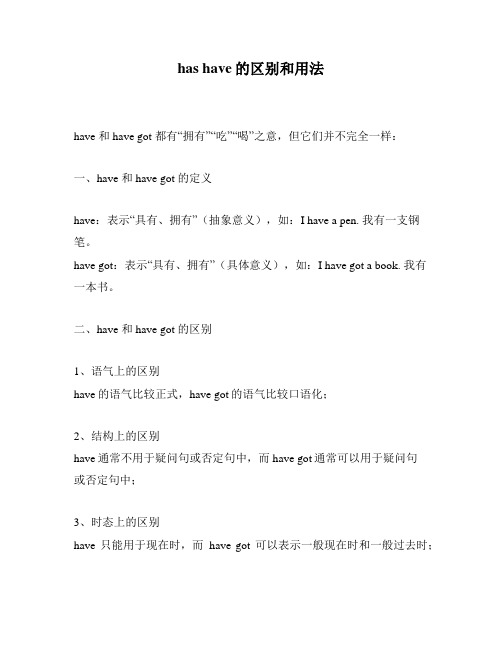
has have的区别和用法have 和 have got 都有“拥有”“吃”“喝”之意,但它们并不完全一样:一、have 和 have got 的定义have:表示“具有、拥有”(抽象意义),如:I have a pen. 我有一支钢笔。
have got:表示“具有、拥有”(具体意义),如:I have got a book. 我有一本书。
二、have 和 have got 的区别1、语气上的区别have的语气比较正式,have got的语气比较口语化;2、结构上的区别have通常不用于疑问句或否定句中,而have got通常可以用于疑问句或否定句中;3、时态上的区别have只能用于现在时,而have got可以表示一般现在时和一般过去时;4、意义上的区别have只表示“拥有”(抽象意义),而have got则表示“拥有”(具体意义)。
三、have 和 have got 的用法1、have用来表示现在拥有某事物,have got用来表示目前拥有或获得了什么:I have a book. 我有一本书。
I have got a book. 我有一本书。
2、have用于疑问句和否定句中时,要改用have got:Have you got a pen? 你有支钢笔吗?Have you a pen? (X)I haven't got any clothes. 我没有任何衣服。
I haven't any clothes.(X)3、have可以表示掌握某种知识,而have got只能表示具体拥有:I have a good knowledge of English. 我对英语非常有把握。
X I have got a good knowledge of English.。
have 和 have got 的用法区别
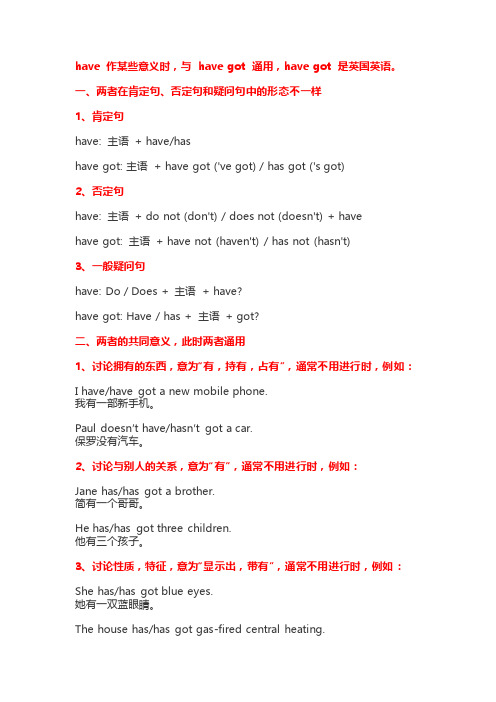
have 作某些意义时,与have got 通用,have got 是英国英语。
一、两者在肯定句、否定句和疑问句中的形态不一样1、肯定句have: 主语+ have/hashave got: 主语+ have got ('ve got) / has got ('s got)2、否定句have: 主语+ do not (don't) / does not (doesn't) + havehave got: 主语+ have not (haven't) / has not (hasn't)3、一般疑问句have: Do / Does + 主语+ have?have got: Have / has + 主语+ got?二、两者的共同意义,此时两者通用1、讨论拥有的东西,意为“有,持有,占有”,通常不用进行时,例如:I have/have got a new mobile phone.我有一部新手机。
Paul doesn’t have/hasn’t got a car.保罗没有汽车。
2、讨论与别人的关系,意为“有”,通常不用进行时,例如:Jane has/has got a brother.简有一个哥哥。
He has/has got three children.他有三个孩子。
3、讨论性质,特征,意为“显示出,带有”,通常不用进行时,例如:She has/has got blue eyes.她有一双蓝眼睛。
The house has/has got gas-fired central heating.这所房子有燃气中央供暖系统。
4、讨论生病或暂时的状态,意为“患…,有…”,通常不用进行时,例如:I have/ I’ve got a cold.我感冒了。
They have/have got a problem.他们有麻烦了。
三、两者的区别1、用have 而不用have got 讨论我们做的事,比如吃饭,度假等,常跟名词a bath、a shower 或a wash,例如:I have a cup of coffee at seven o’clock.我七点钟喝杯咖啡。
have和havegot
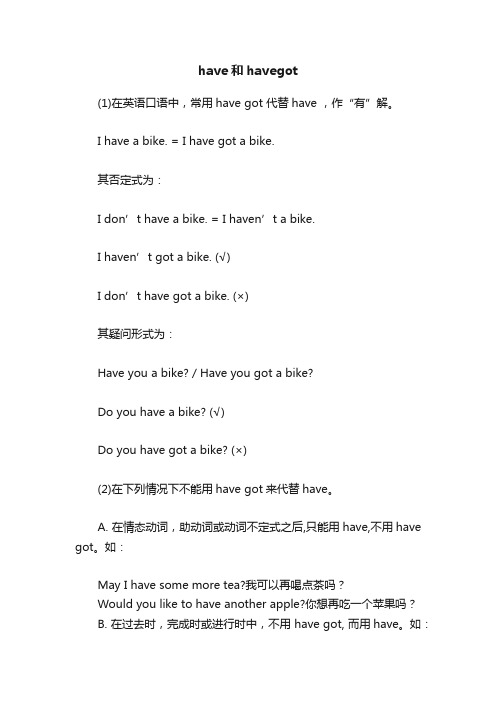
have和havegot(1)在英语口语中,常用have got 代替have ,作“有”解。
I have a bike. = I have got a bike.其否定式为:I don’t have a bike. = I haven’t a bike.I haven’t got a bike. (√)I don’t have got a bike. (×)其疑问形式为:Have you a bike? / Have you got a bike?Do you have a bike? (√)Do you have got a bike? (×)(2)在下列情况下不能用have got来代替have。
A. 在情态动词,助动词或动词不定式之后,只能用have,不用have got。
如:May I have some more tea?我可以再喝点茶吗?Would you like to have another apple?你想再吃一个苹果吗?B. 在过去时,完成时或进行时中,不用 have got, 而用have。
如:Li Hong had a problem.李红有一个问题。
I have had the bike for three years.我买这辆自行车已经3年了。
C. 固定短语中不用have got。
have a rest/ a swim/ a wash/ a drinkhave lunch, have a meeting, have a party, etc.have got 和have意思一样,都有"有"的意思,have got多用于口语。
他们在下面情况下可以互换。
① I have a pen. I have got a pen. “有”② I have a headache. I have got a headache. “得病”③ have to = have got to以上三种情况have =have gothave got 是英式英语的用法,一般用语口语,非正式语言。
- 1、下载文档前请自行甄别文档内容的完整性,平台不提供额外的编辑、内容补充、找答案等附加服务。
- 2、"仅部分预览"的文档,不可在线预览部分如存在完整性等问题,可反馈申请退款(可完整预览的文档不适用该条件!)。
- 3、如文档侵犯您的权益,请联系客服反馈,我们会尽快为您处理(人工客服工作时间:9:00-18:30)。
• 注意 Have / has got 没有时态的变化,只能用于 一般现在时,不能用于完成时,过去式和 将来时等时态
• Li Hong had a problem yesterday. • I have had the bike for three years.
Will 和be going to 区别
1. be going to 表示根据某种迹象,将来肯定 发生的事情,而 will 则没有这个意思 He is seriously ill. He is going to die.
2. be going to 含有“计划,准备”的意思,而 will 则没有这个意思 P 46 A
2. They bought ten computers last term.
Ten computers were bought (by them)ห้องสมุดไป่ตู้last term.
固定短语中不能用Have/has got
Have breakfast/ lunch/dinner/supper Have a cup of tea/ coffee/ cigarette Have a bath/ a shower/ a swim/ a rest Have a party/ a holiday/ a nice time Have an accident/ an experience Have a look/ a chat/ a baby Have difficulty/ trouble/ fun
I am going to meet Tom at the station at six. 我六点钟要到火车站去接汤姆。
• 2.表示说话人根据已有的迹象认为非常可 能即将发生某事。如:
Look at these black clouds——it is going to rain. 看这些乌云——要下雨了。 I’m afraid I’m going to have a bad cold. 恐怕我要得重感冒了。
• 二、Will +动词原形 Will 可用于任何人称(口语中)
1.表示主动愿意或要求去做某事 The bag looks heavy. I’ ll help you with it.
• 2.表示预料中将要发生的动作或情况。 You’ll feel better after having this medicine. 吃了这药,你就会感到好些的。
He is fourteen this year, and he will be fifteen next year. 他今年十四岁,明年十五岁。
• 二、Shall+动词原形 Shall 用于第一人称 表示建议或征求对方的意见。
Shall we go at eight? 我们八点去好吗? I shall go now.
have 与 have got区别
二者的否定和疑问不同
• Have 的否定 don’t / doesn’t have I don’t have a car.
• Have/ has got 的否定 主语+haven’t(hasn’t) got +其他 I haven’t got any money.
Passive
被动语态
一:英语的谓语动词有两种语态
We speak
主语
谓语
English.
宾语
主动语态
English is spoken by us.
主语
谓语
宾语
宾变主,主变宾,前加by
主变被解题步骤:
1. 找宾语 ----即动作的承受者 2. 判断宾语的单复数 ----即be动词的单复数. 3. 判断动词的时态 ----即be动词的时态. 4. 将原句动词改为过去分词 5. 修改原句的主语 ----即by+ 主语/ 宾语.
Future
将来时态
一般将来时表示在将来某个时间 要发生的动作或存在的状态
• 一、be going to+动词原形 • 1.表示打算在最近或将来要做某事。这种
打算往往是事先考虑好的。如:
My brother is going to learn English next year. 我哥哥准备明年学英语。
• 注意:
• 1. 如果be going to后接的是形容词或副词 (there)时,其后应加上be,然后再接形容 词或副词。
I’m going to be busy this Sunday.
这个星期天我很忙
• 2. there be句型也可用于这种句型中,但 there不能和have连用。
There is going to be an English film this evening. 今天晚上有一场英文电影。
Exercise:
He rides the motorbike to his factory every day.
The motorbike is ridden to his factory every day.
Exercise:
We call the snowman Mr. Strong.
The snowman is called Mr. Strong.
They make shoes in that factory.
Shoes are made by them in that factory. were
被动语态的大体构成: Be + PP(过去分词)
主动语态变被动之歌:
被动语态强调宾,be后加上过去分。 Be要随着主语变,人称时态要弄准。 行为对象作主语, 逻辑主语by来引。
• 3.will表示人的主观意愿,它带有浓厚的 感情色彩。
Come earlier tomorrow, or I won’t let you in. 明天早点儿来,否则我不让你进来。
• 4.在问对方是否愿意或表示客气的邀请或 命令时,常用will。
Will you go to see a film with us? 你愿意和我们一起去看电影吗? 5.表示不以人们的意志为转移的规律。
